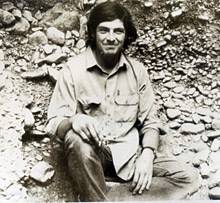
Chest-deep in a hole at the edge of the Sahara desert in Tunisia, clawing through chicken bones, cat skeletons and 2,000-year-old muck, Lance Holter remembered why he had joined the Peace Corps
About Lance Holter
Peace Corps Celebrates 35 Years
Of Service to the World - People to People
By Tom Stevens (Reprinted from the Haleakala Times, March 1996)
It was 1972 and Lance was...
Chest-deep in a hole at the edge of the Sahara desert, clawing through chicken bones, cat skeletons and 2,000-year-old muck, Lance Holter remembered why he had joined the Peace Corps.
"I was a very patriotic person, but I couldn't relate to all the mayhem America was involved with in Vietnam," recalled the Pa'ia contractor, one of 140,000 Americans to serve in the Peace Corps since its foundation 35 years ago this week.
The year Holter joined was 1972. Then-president Nixon was bombing Southeast Asia, and the last of 550,000 GIs sent to wage war in Vietnam were diving into foxholes under enemy fire.
Half a world away, Holter "waged peace" in the arid hill country of Tunisia as part of a team of American and North African well diggers. Their foxholes were ancient water holes; their enemies poverty and disease.
"I'd rock up to a village in my little French Explorer van, and for the first half hour I'd medicate people's sores and boils and talk to them in my eighth-grade Arabic about where disease comes from. I'd try to explain that disease comes from little organisms you can only see with a microscope, but they weren't buying that. They told me: 'If Allah wants, Allah eats.'"
It was a hard sell for a 20-year-old plumber's apprentice from Wyoming, but Holter was motivated by the suffering he encountered.
"The statistics were terrible. Half the children died in childbirth, and half of the rest died in the first year. Of those who survived, many were retarded and 90 percent carried parasite infections from drinking contaminated water."
The water came from dozens of muddy water holes and open wells, some dating back to the Phoenician and Roman empires. Infection spread as the desert villagers drew water from the same holes fouled by their camels and donkeys. Cholera was a constant danger.
"Because goats had denuded the mountains of vegetation, there'd be these big floods, then a whole year of people coming to the springs to get their water. The animals would carry it away in buckets or big clay pots, and their manure would wash into the water source."
Holter's crew was charged with cleaning out, walling and repairing established wells and "divining" for new ones. To this end, the Peace Corpsmen recruited 15 teams of veteran "Puisatiers" (masons and well-diggers) from villages along Tunisia's Mediterranean coast and quickly got a lesson in Old World politics.
"We were supposed to do 120 wells in two years, but we discovered to our dismay that we were building them for the sheiks, who already had wells. As a sheik, if you had a well you could grow a hectare of vegetables and sell them in town. Anyone who borrowed water from you was in your debt, so you could extract baksheesh (payoff money) from them."
Holter said he also discovered that the Tunisian labor contractor hired by the sponsoring CARE program was skimming a third of the well-diggers' wages each pay period. "The contractor was extracting money from the sheiks and the puisatiers. I did the banking and driving, so I knew how much he was getting paid per team. It was supposed to be 15 dinars (about $30) a day per team, but they were only getting 10, and he was pocketing the other five."
A talk with the CARE officer got the contractor fired, Holter said, and the reformatted puisatier force started developing new wells, thereby skirting sheik control of traditional sites. "There had been so much graft built into the system that they were only digging 15 wells a year, but once we reorganized, we built 80 in three months. We probably upset the social order of the whole area."
"The puisatiers taught us how to find water by watching the lay of the land. You could tell where underground streams ran by the fissures and contours in the surface and by looking for seeps. We started making wells that hadn't been there before, and the sheiks didn't get any more."
By developing clean water sources where people lived, Holter said, villagers could irrigate their own gardens free from payoffs. By the end of his Peace Corps tour, Holter's team had overseen the repair and construction of 240 wells - twice the original quota.
"Just think if we had sent 500,000 Peace Corps volunteers to Vietnam instead of 500,000 soldiers," he mused. "If we had gone to Vietnam and built bridges and wells. If we had stood up for what was right instead of what was politically correct.
"I think America can do more than bomb the jungle," he continued. "I know America is a great and powerful nation and we can do something like this."
On the other hand, Holter reflected, his Peace Corps experience taught him that the world is a lot more subtle and complex than it once seemed to a 20-year-old volunteer from Wyoming.
Asked how the Peace Corps had changed him, he replied: "It taught me a lot about how to be creative and inventive, and I'm not so ethnocentric any more. I realize we're just one of the peoples on earth, and we don't have all the answers. Who knows? Maybe it all does happen from Allah.
"It's made me more grateful for what I have," he continued. "It's made me more tolerant, because I can see how bad it can really get. And it's made me more patient with our own byzantine Maui County government."
For their part, Holter said, the Tunisians got 240 wells, the possible impression that "not all Caucasians are arrogant monsters," and hope for a healthier future.
Sitting in his Pa'ia living room, Holter paged through a scrapbook of fading photos he shot nearly 25 years ago. "Maybe this girl's children didn't have to walk 10 miles to get water," he mused. "Maybe they didn't die from cholera. Maybe one of these little kids in the village is the Tunisian Einstein now. My satisfaction is to be able to think about these guys who jumped from the 17th century to the 20th century in a year."





